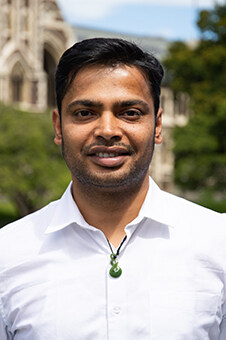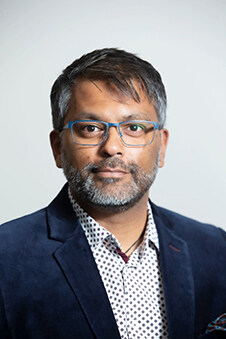A University of Otago researcher and a medical oncologist have won the 2021 Roche Translational Cancer Research Fellowship Award, worth $30,000, for their project on lung cancer.


Associate Professor Aniruddha Chatterjee in the Department of Pathology at Otago and Dr Rajiv Kumar a medical oncologist in Christchurch and honorary Senior Research Fellow in the Department of Pathology at Otago, were announced as winners at the recent New Zealand Society for Oncology Annual Conference.
Alexander Muelhaupt, General Manager for Roche Products New Zealand, says: “Roche is proud to support the NZ Society for Oncology Roche Translational Cancer Research Fellowship, which encourages collaboration between scientists, such as Professor Chatterjee and clinicians, such as Dr Kumar, to develop translational research projects.
“Their project has the potential to bring direct benefit to New Zealand lung cancer patients and I congratulate them both on the receipt of the Fellowship and the work they’ve done to date.”
Dr Kumar says the Fellowship funding will be used to develop a DNA methylation panel for the early detection and tracking of treatment response in lung cancer patients.


“The collaboration this Award supports is what is so exciting about this project for us. The opportunity to develop the latest advances in science from the laboratory so they can be applied in clinical settings, and seeing them improve patients’ outcomes is immensely rewarding,” he says.
Lung cancer is a leading cause of cancer death world-wide. New Zealand has one of the highest rates of lung cancer and Māori are four times more likely to die from lung cancer than non-Māori.
Associate Professor Chatterjee says although surgery and radiotherapy are effective treatments for early-stage lung cancer, 80 percent of patients are diagnosed with late-stage disease, when their tumours are no longer curative.
“The challenge with lung cancer is that often we only have small biopsy samples from current techniques. When insufficient tissue is available for molecular diagnostics, a repeat biopsy and molecular diagnosis is not always possible.”
The analysis of tumour DNA circulating in a patient’s blood is likely to provide a solution to this challenge. The ‘liquid biopsy’ obtained could potentially be developed as a tool to both diagnose and treat cancer.
It has been established that detecting alteration in DNA methylation is one method of detecting tumours much earlier. Associate Professor Chatterjee and Dr Kumar are aiming to use advances in next generation sequencing for robust analysis of a DNA methylation panel in clinical settings across New Zealand.
New Zealand Society for Oncology President Associate Professor Margaret Currie says the winning pair put forward a very strong proposal that met all the criteria for the Roche Translational Cancer Research Fellowship.
“Associate Professor Aniruddha Chatterjee and Dr Rajiv Kumar were unanimously selected by our panel of international judges, whose job was made more difficult by the range of excellent applications received this year.”






































